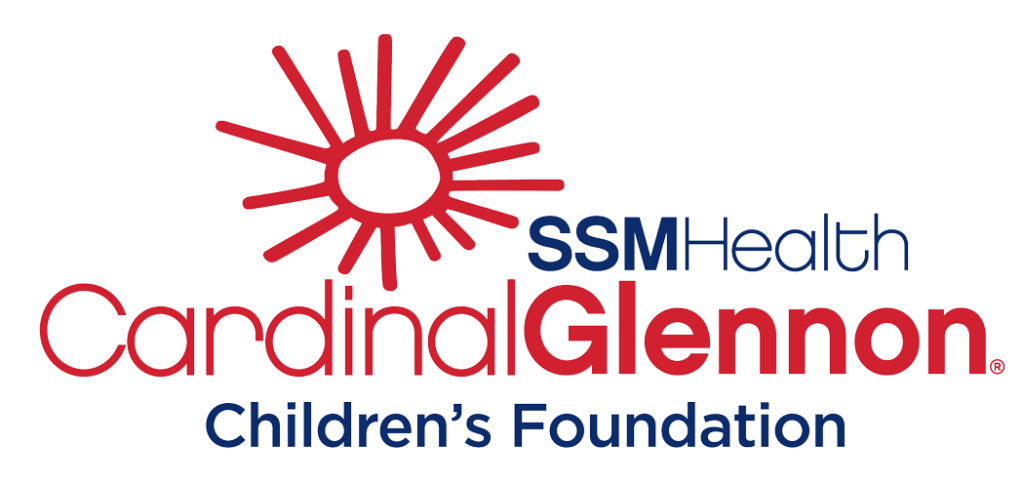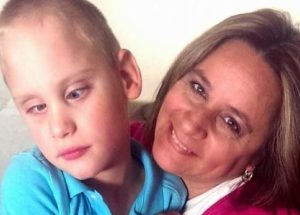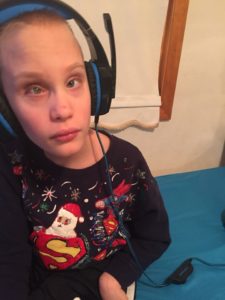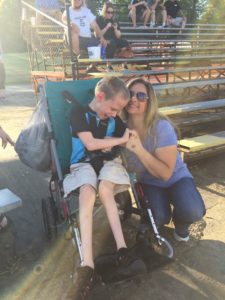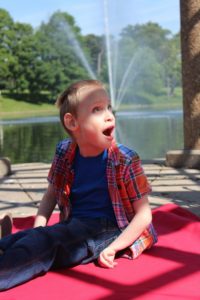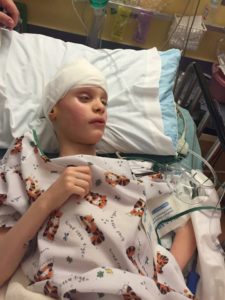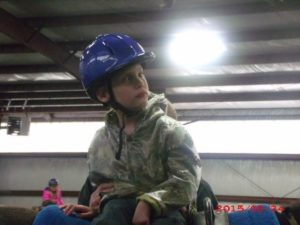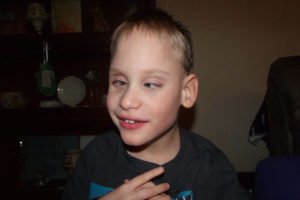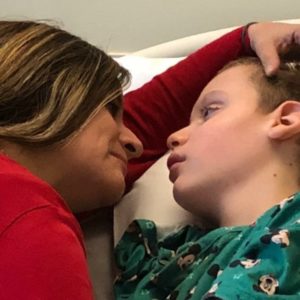Our Patients:
Aidan Milner

Baby Aidan was born at 23 weeks gestation at St. Anthony’s Medical Center. It was an unexpected and unanticipated early arrival. After a few short days, Aidan was transferred to the NICU at SSM Health Cardinal Glennon Children’s Hospital. He spent the next 70 days there, with what mother, Carla recalls as “so many ups and downs”. Vulnerable and fragile due to his gestational age, Aidan experienced a level 4 brain bleed with a midline shift, which resulted in him having cerebral palsy. His heart, lungs, and right side were unaffected; however, he suffered left sided weakness and has no functional use of his arm or leg on that side. Approximately four months following the bleed, Aidan began having seizures. At that point, a ventriculo-peritoneal shunt was placed, and life with a shunt and seizures became part of Aidan’s ongoing medical journey.
Through the years, Aiden has gone blind. He has had 14 surgeries, which have included two hip surgeries, shunt placements, and eye surgeries, just to name a few. He has many specialists including Neurology, Orthopedics, GI, and Ophthalmology, and he has frequent visits to our outpatient clinics.
During the summer of 2018, Aidan began showing some symptoms that required him to have a shunt revision surgery. That surgery was in July, and during that surgery, he suffered a stroke. Carla says that “the stroke affected his nervous system quite drastically. His level of consciousness, his arm and leg movements, his ability to express emotions, his swallowing, and even his basic breathing have all been impacted significantly. He recovered enough to transfer to Ranken Jordan Pediatric Bridge Hospital for some extensive rehabilitation; however, after two weeks, we had to come back to Glennon because he had some increased tone, respiratory problems, and neurological ‘storming’,” Carla says. The “storming” episodes can include such things as fever, high blood pressure, elevated heart rate, elevated respiratory rate, intermittent agitation, disorientation, profuse sweating and dystonia (abnormal body posture that looks like rigid extension of the arms and legs, downward pointing of the toes, and backward arching of the head.) The symptoms may vary among different individuals, along with the duration and intensity of the symptoms.
Though a viral process was the likely culprit of the onset of Aidan’s symptoms and increased storming, Aiden is still hospitalized at SSM Health Cardinal Glennon, recovering and fighting. Carla finds it increasingly difficult to watch her son struggle. She states that, “his stroke compromised our ability to communicate. It used to be second nature to us both.” There is one thing, though, that Carla states has consistently been a way for them to “speak” to each other, and that is MUSIC. Carla recalls that music has “always been Aidan’s pacifier ever since he was born”. She says that “Whether it’s singing, the radio, or any other form, music has ALWAYS calmed and relaxed Aidan through fear and anxiety in the hospital, during procedures, through school or any other setting. He is able to interact with us in his own – like through a smile or other body language to let me know that he is comfortable,” Carla says. Recently during one of Aidan’s especially tough days, Carla and Aidan’s nurse were talking about the healing power of music for Aidan. The nurse mentioned to Carla that she could consult the Music Therapist, if Carla felt it would be a good idea. Carla excitedly agreed, and Cardinal Glennon Music Therapist, Kelli McKee, came to visit with Aidan. “When she entered the room,” Carla recalls, “Aidan was having a severe storming episode. Kelli asked a few basic questions about what kind of music Aidan liked, but then immediately began singing to him.” The two of them watched in a bit of shock and awe, as Aidan’s numbers on his monitors began to normalize. “His heart rate and respiratory rate decreased, his breathing and posturing mellowed, and he became visibly calm and comfortable,” Carla says, “It was Harvest Moon that she sang to him, and seeing him react that way and not be in so much distress, was the biggest present I could have ever received,” Carla says. “Music therapy of some character has been a part of Aidan’s everyday routine whether it is radio, CD’s, someone singing to him, 1:1 therapy, group therapy, or otherwise. But seeing the evidence on his monitors of how the music truly affects him, was so amazing, and so comforting, and definitely powerful for his caregivers and staff to witness, as well,” says Carla. “Kelli made such an impact that day,” Carla adds, “and I hope that we can have her visit regularly as he recovers, because she truly makes a difference. I am certainly grateful for any time we can get her, but I realize she’s only one person, and we need to share her with the other patients who need her so much, too. We have a long way to go. Seeing my son comfortable, when we don’t have much control over the rest, makes all the difference in the world.”
